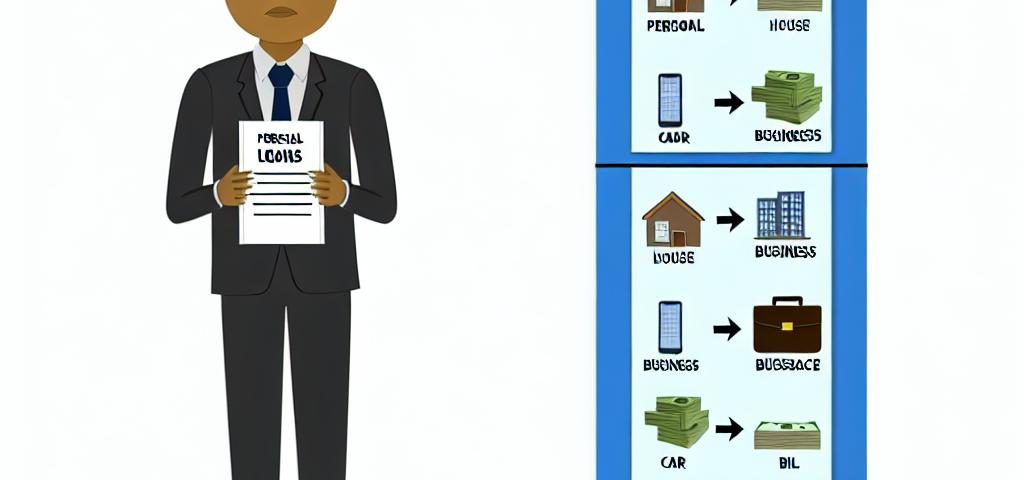Understanding Personal Loans and Business Loans
When considering financing options, it’s crucial to understand the distinctions between personal loans and business loans. Both serve different purposes and have specific requirements, terms, and implications.
Purpose and Use
Personal Loans are typically designed for individual use. They are often utilized for covering unexpected expenses, consolidating debt, or funding personal projects. The flexibility in the use of funds makes personal loans appealing to many. This flexibility allows borrowers to use the funds as needed, which can be particularly beneficial in addressing urgent financial requirements where time is of the essence.
In contrast, Business Loans are specifically tailored for business-related expenses. These expenses include activities such as starting a new business, managing cash flow, purchasing inventory, or expanding operations. Lenders offering business loans often require a clear business plan accompanied by a detailed explanation of how the loan funds will be used. This requirement ensures that the loan directly contributes to achieving business goals or improving the business’s financial health.
Loan Amounts and Terms
The amounts available for personal loans can vary significantly, typically ranging from smaller sums, such as a few thousand dollars, up to larger amounts, possibly reaching $100,000. The borrower’s credit score plays a crucial role in determining the amount that can be borrowed, as well as the terms of the loan. Generally, individuals with a higher credit score may access larger amounts and more favorable terms.
Business loans, on the other hand, typically offer higher amounts to accommodate various business needs. Depending on the type and scale of the business, loans can range from the modest sum of $5,000 to several million dollars. The repayment terms for business loans can vary widely, often spanning several years. These terms are influenced by the business’s financial health, credit history, and projected cash flows, which the lender will analyze carefully before approval.
Eligibility and Requirements
In the case of personal loans, lenders primarily consider an individual’s credit score, income, and overall credit history. These criteria collectively form an assessment of the borrower’s ability to repay the loan within the agreed timeframe. A stable income and a positive credit history generally increase the probability of securing a personal loan at better terms.
Business loans, however, involve a more complex evaluation process aimed at understanding both the business’s and the owner’s financial stability. Lenders look at factors such as the business credit score, the company’s financial statements, and the length of time the business has been operational. Sometimes, lenders may also consider the personal credit score of the business owner, especially if the business is small or the borrowing request is substantial. Notably, it’s not uncommon for lenders to request collateral or a personal guarantee, particularly for larger loan amounts. Offering collateral can markedly enhance the lender’s confidence in the borrower’s ability to repay, thereby expanding access to higher loan sums or more favorable interest rates.
Interest Rates and Fees
Interest rates for personal loans are generally fixed, meaning they stay constant over the term of the loan. These fixed rates are primarily determined by the applicant’s creditworthiness, making it vital for applicants to maintain a good credit score to potentially reduce borrowing costs. Fixed rates offer the borrower predictability in terms of repayment amounts throughout the loan duration.
Conversely, business loans may offer either fixed or variable interest rates. Unlike fixed rates, variable rates can fluctuate based on the market interest rate, which may alter the cost of borrowing over time. While variable rates can sometimes offer lower initial costs, they can also introduce a level of financial unpredictability, especially in a volatile interest rate environment. Additionally, business loans may incorporate a more diverse fee structure, potentially including arrangement fees, processing fees, and early repayment penalties. These fees can affect the total cost of the loan and should be carefully reviewed by any potential borrower.
In summary, understanding the intricate differences between personal and business loans provides borrowers with the knowledge necessary to make informed decisions about their financing options. Each option is tailored for specific uses, comes with its own set of terms, and requires different eligibility criteria. Monitoring personal credit scores and thoroughly evaluating business financial health are essential steps before applying for either form of loan. Nonetheless, both types of loans offer vital support for individuals and businesses alike, serving as critical tools to manage financial needs effectively and promoting economic growth.
For more detailed information on choosing the right type of loan, consider visiting here for personal loans and here for business loans.

